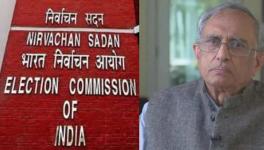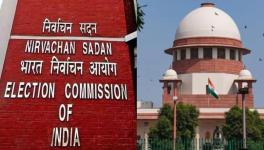The Election Commission's Concerns About Electoral Bonds Fall on Deaf Ears

Contrary to what had been presumed, the Legislative Department of the Ministry of Law and Justice (MoLJ) had forwarded the concerns of the Election Commission of India (ECI) – that the electoral bond scheme would not make the funding of political parties more transparent – to the Department of Economic Affairs (DEA) in the Ministry of Finance. However, the Finance Ministry headed by Arun Jaitley, whose brainchild the electoral bonds scheme was, has been completely silent on the infirmities of the scheme and its inability to make political funding in the country less opaque.
New information obtained under the Right to Information Act has revealed that the MoLJ had sent a letter and two reminders between July 3, 2017 and June 8, 2018 to the DEA seeking its response to the ECI's letter dated May 26, 2017. The ECI's letter had stated that the amendments made to introduce the electoral bond scheme would shield corporates as well as political parties from disclosing donations made by the former to the latter in their account statements.
These amendments were effected through the Finance Act, 2017. The ECI had accordingly sent a letter addressed to the Secretary, Legislative Department, Ministry of Law and Justice, stating their reservations on the amendments to the Companies Act, Income Tax Act and the Representation of the People Act (RPA). However, as Newsclickhad reportedbefore, the letter went unanswered.
On June 8, 2018, retired Commodore Lokesh K. Batra filed an application under the Right to Information Act, seeking copies of the file notings and other follow-up actions taken by the Legislative Department, MoLJ, after they had received the ECI's letter. The department responded to Batra's application on June 14, 2018. The reply shows that the department had taken steps after receiving the ECI's letter – the most recent being on June 8, 2018, almost a year after the letter had been received.
According to the information Batra received, on June 21, 2017, the Legislative Department, MoLJ had mentioned that the letter had been received, and it had proposed forwarding the ECI's concerns of the amendments to the Companies Act to the “Company Affairs”. The next note on June 23, 2017 mentioned that the Legislative Department, MoLJ, should seek a response from the DEA regarding the ECI's letter. On July 3, 2017, the Legislative Department of the MoLJ sent an Office Memorandum (OM) to the Deputy Secretary (Cord), R V Pandala in the Department of Economic Affairs (DEA), Ministry of Finance. The OM reiterated the ECI's comments on the amendments and 'requested' the DEA to submit theirs. On August 18, 2017, the Legilsative Department, MoLJ sent a follow up OM to the DEA requesting them to submit their views and comments, “so that the matter could be taken forward”. Almost a year later – presumably after Batra filed his application under the Right to Information Act – on June 8, 2018, another OM was sent to the DEA again seeking their response. The file notings since the first OM was sent also reflect that the Legislative Department, MoLJ was awaiting a response.
The note on June 23 mentioned that the Legislative Department, MoLJ “may, in the first instance, call for the comments of [the Department of Economic Affairs/Revenue, Ministry of Finance] in respect of [paragraphs] 2 and 4 of the preceding note. [Paragraph] 3 is a consequential amendment, which would be taken up along with other proposals for amendment of [the Representation of the People] Act, 1951 in [the] future.”
The preceding note referred to was a summary of the ECI's letter sent in 2017. Paragraph 2 of the summary concerned the ECI's opposition to the amendment of section 29C of the Representation of the People Act (RPA). The amendment inserted a proviso that exempts electoral bonds from being reported by political parties in their account statements. The ECI, in their letter, had called this amendment a “retrograde step”. The ECI had also voiced concern that this amendment may allow illegal contributions – from government companies and foreign sources – to go unnoticed.
Paragraph 4 referred to the amendments to section 182 of the Companies Act. One amendment removed the earlier restriction that only a maximum of 7.5 per cent of the company's average profits in the three preceding financial years can be donated. The other amendment relaxed the previous law that companies must declare their political donations and the name of the party they have made the donations to, in their annual profit and loss account. Thus, companies now only have to declare their total political donations without mentioning names of any political party. The ECI's letter stated that this would allow shell companies to be set up for no purpose other than to make political donations.
Paragraph 3, which the Legislative Department, MoLJ had referred to as a 'consequential amendment', concerns section 13A of the Income Tax Act. The amendment to this section bars all cash donations above Rs. 2,000 to political parties. The ECI's letter had stated that despite this amendment, due to section 29C of the RPA, the limit on anonymous donations still remains at Rs. 20,000. The ECI had recommended that the RPA be amended to reduce the limit to Rs. 2,000, so as to bring the two Acts in consonance.
What is intriguing is that the Legislative Department, MoLJ did not follow up on the matter from August 2017. When one considers that the ECI decided not to publish their May 26, 2017 letter and the lack of action on the part of both the MoLJ and the DEA, one has to wonder whether this really reflects bureaucratic incompetence. Batra will be filing a further application under the Right to Information Act in the DEA regarding this issue. Perhaps after the DEA's response one may have a clearer picture about where the buck has stopped.
Get the latest reports & analysis with people's perspective on Protests, movements & deep analytical videos, discussions of the current affairs in your Telegram app. Subscribe to NewsClick's Telegram channel & get Real-Time updates on stories, as they get published on our website.
























